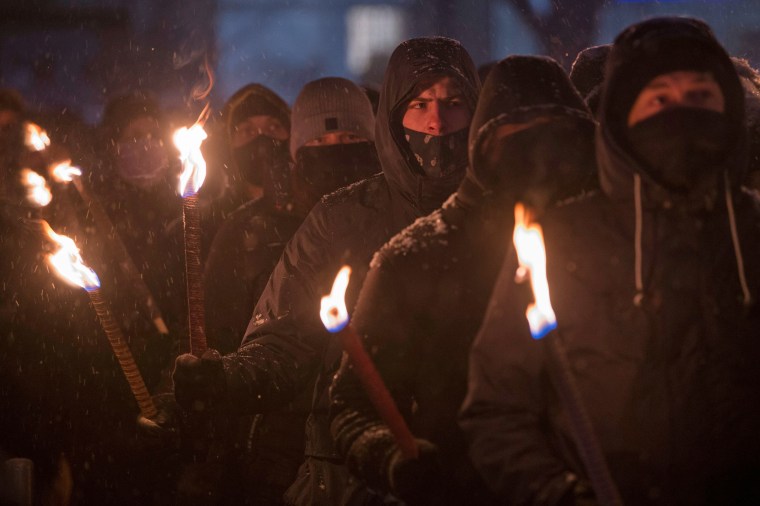Last week, NBC News obtained a recording revealing that a top administrator in a Texas school district instructed teachers to use books offering “opposing” perspectives on the Holocaust. The appalling notion of excusing or justifying genocide rightly sparked condemnations from politicians and human rights leaders.
Unfortunately, we don’t have to wonder about the chilling ramifications of both-sides-ing the Holocaust — it’s already happening.
This goes beyond forgetting the Holocaust; it’s about raising entire generations to view perpetrators as heroes.
In the U.S., we have monuments to Nazi collaborators in New York, New Jersey, Illinois, Wisconsin and Ohio, among other states. In Europe, it’s worse. Parades honoring Holocaust perpetrators are held in European capitals, where veterans of Nazi divisions that exterminated Jews and Roma are feted as heroes. In countries like Hungary and Lithuania, the war on Holocaust history is already being waged across school curriculums, literature and museums and in the courts. Book bans are becoming increasingly prevalent. Poland and Ukraine already have laws making it illegal to rebut distortion over Holocaust participation; another is being developed in Lithuania.
This goes beyond forgetting the Holocaust; it’s about raising entire generations to view perpetrators as heroes.
Want more articles like this? Follow THINK on Instagram to get updates on the week's most important political analysis
The vast majority of those being honored are Nazi collaborators from Central and Eastern Europe responsible for the deaths of hundreds of thousands of Jews. The governments and paramilitaries in question played crucial roles in the Holocaust: They formed auxiliary police units that rounded up Jews, imprisoned them in ghettos, transported them to concentration camps and killing fields, carried out executions and hunted down escapees and survivors. In turn, the military and police assistance provided by these collaborators allowed Germany to expand and continue the genocide. Simply put, the Holocaust as we know it couldn’t have happened without them.
In the quiet Chicago suburb of Libertyville, one can visit the bust of Pavle Đurišić, a commander in the Serbian Chetnik collaborators who received the Iron Cross, a Nazi Germany military honor. Another Chicago suburb has a monument to Adolfas Ramanauskas-Vanagas, who, according to the Simon Wiesenthal Center, led a Lithuanian militia unit responsible for persecuting Jews. Baraboo, Wisconsin, and Ellenville, New York, have busts of Stepan Bandera and Roman Shukhevych, leaders in a faction of the antisemitic Organization of Ukrainian Nationalists, which pledged allegiance to Hitler. Shukhevych was also a commander in a Third Reich auxiliary battalion involved in lethal antisemitic violence and repression of partisans resisting the Nazis. New York City has plaques celebrating French collaborators Philippe Pétain and Pierre Laval, whose Vichy government deported over 75,000 Jews to death camps. Less than an hour from the Big Apple stands a monument to Russian traitor Andrey Vlasov, who commanded a Nazi collaborationist army.
But these American examples pale in comparison to the Holocaust revisionism happening across the Atlantic. Under authoritarian Prime Minister Victor Orbán, Hungary has embraced the cult of Hitler ally Miklós Horthy, as well as virulently antisemitic poets. Croatia is furiously whitewashing the Ustashe fascists who systematically slaughtered hundreds of thousands of Serbs, Jews and Muslims. Estonia, Latvia and Ukraine openly celebrate their countries’ divisions in the Waffen-SS, the military wing of the Nazi Party responsible for the Holocaust, among other war crimes.
How is all this justified? It turns out presenting an “opposing” perspective of the Holocaust, to quote the Texas administrator, is remarkably simple. One has to recast the perpetrators into something more palatable: victims and freedom fighters. That’s easily accomplished with a little cynicism, such as the kind demonstrated by then-President Donald Trump, who, in response to the deadly 2017 neo-Nazi rally in Charlottesville, Virginia, insisted that there were fine people on both sides.
Most often, the governments and far-right groups whitewashing Nazi collaborators claim their “heroes” weren’t fighting alongside Hitler but rather against the Soviet Union. Even more perversely, these Holocaust perpetrators, many of whom were defeated by the Red Army, are often cast as victims of the USSR.
This logic, for lack of a better word, is easily refutable. The Soviet Union was at war with Nazi Germany; under this rubric, everyone who fought against the USSR — i.e., the entire Third Reich — was a freedom fighter. Under this logic, even Hitler, who was driven to suicide as the Red Army encircled Berlin, was a victim. According to the whitewashing, there were plenty of victims on both sides.
Although the whitewashing has been happening for years, the backlash to Covid safety measures has made it easier to distort the Holocaust. The pandemic triggered a wave of analogies comparing vaccines and mask mandates to the Nazi persecution of Jews. Every news cycle stirred by such reprehensible analogies reinforced the illusion of “debates” over the Holocaust, propagating the notion that perhaps there is more than one valid perspective on genocide.
Unfortunately, this revisionism is not only an insult to the dead but also a danger to the living. Wherever you see monuments and books presenting “opposing perspectives” about the Holocaust, you see angry — and organized — men carrying torches and focused on violent agendas. In Hungary, neo-Nazis use World War II anniversaries to celebrate their heroes and network among various groups. Torches light the nights in Bulgaria, Slovakia, Ukraine, Lithuania, Spain and Croatia, among other countries. All these are ostensibly to offer “opposing perspectives” on the Holocaust. All provide a chilling view of the dangers of such rhetoric.
Related:


